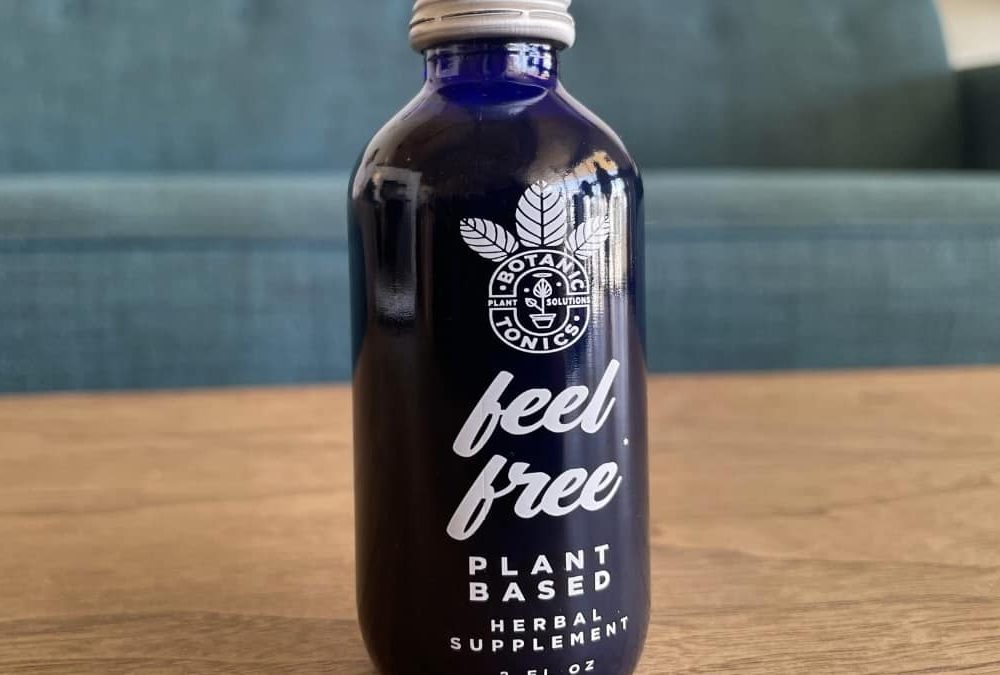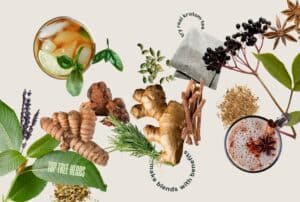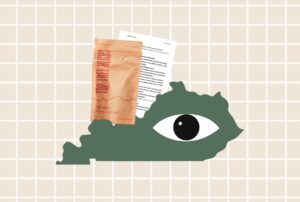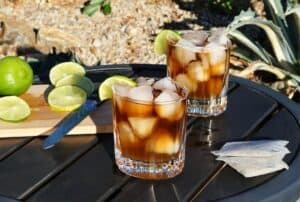If you’ve been to a hip coffee shop, a grungy head shop, or anything in between, you may have come across a small blue bottle called “Feel Free.” These shots, made by Botanic Tonics, contain kava and “other ancient plants.”
The company markets them as a plant-based tonics and herbal supplements. But what exactly are these “other ancient plants”? What is in Feel Free Tonic beverages; can customers even know exactly what they’re drinking?
The answer is a point of controversy. It has put Botanic Tonics’ Feel Free drink in the spotlight. A former customer is now suing the kratom tonic brand. This Feel Free lawsuit is related in part to the ambiguity surrounding kratom, and in part to a misunderstanding of kratom and its effects.
Read on to understand how the Feel Free lawsuit developed and how it may impact the entire kratom industry.
What Is Botanic Tonics?
Botanic Tonics is a relatively new kratom and kava company based in Santa Monica, California. They were founded in 2020. Since then, they have seen a meteoric rise in popularity.
They had a “unique” marketing strategy and used aggressive wholesale sales tactics to push their Feel Free “wellness tonic.” Now, their California-styled 5-hour ENERGY alternatives are everywhere.
In late March 2023, a class-action lawsuit against Feel Free left Botanic Tonics scrambling to defend themselves. So, why is Feel Free being sued? Well, the lawsuit stems from allegations that the company misrepresented their Feel Free drink. Additionally, they have been accused of being responsible for a former alcoholic relapsing on their addiction.
We’re going to walk you through the allegations against the company and the Feel Free plant-based tonic. We’ll also offer our take on Botanic Tonics’ marketing-by-omission methods. Finally, we’ll explain how the Feel Free lawsuit affects the kratom industry as a whole.
What Does Botanic Tonics’ Feel Free Do?
Botanic Tonics markets Feel Free as a wellness tonic. On their website they recommend drinking it for “relaxation, productivity, focus and so much more!” Feel Free’s primary ingredients are listed as kava extract and a small amount of kratom leaf. Per their current labelling, it contains “3500mg” of “kratom leaf,” or per their old labelling: 50mg of kratom alkaloids in the form of leaf kratom. It is sold as a liquid shot, in 2 oz. blue glass bottles.
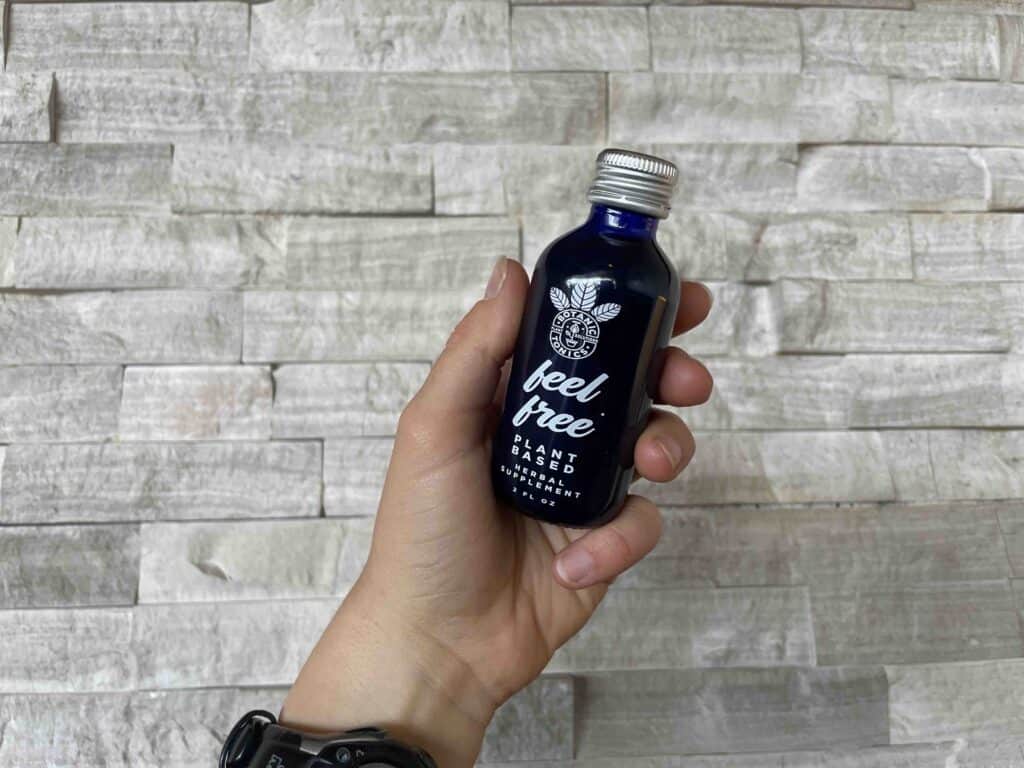
A 2 oz bottle of Botanic Tonics’ Feel Free Tonic is available at most head shops and vape shops. Each bottle can cost upwards of $10, and contains 2 servings of a proprietary kava and kratom mixture.
As a Santa Monica based company, their vision has always been to be seen as a lifestyle brand for the rapidly growing “sober” market demographic who are shying away from alcohol and energy drinks.
Botanic Tonics tout the benefits of Feel Free over alcohol and caffeine as being “a social lift without the booze (or hangover)” and “a clean energy boost without the jitters.”
For those of us familiar with kava and kratom—psychoactive plants native to the South Pacific and Southeast Asia, respectively—these claims aren’t new. Many companies tout similar benefits for their kratom and/or kava products. So why is Feel Free being sued, and why are we writing about them?
Feel Free Botanic Tonics Ingredients: Are They As Advertised?
Currently, the Botanic Tonics website describes the Feel Free tonic as “Our newest feel-good wellness tonic is a kava drink made with kava, kola nut, lion’s mane and rhodiolahas.” The Feel Free Classic, which is subject to the lawsuit and controversy, is still described as a mixture of “kava + other ancient plants.” (Only in non-searchable images is kratom disclosed as an ingredient.) But at least Botanic Tonics discloses what the “other ancient plants” are in the drink, right?
Well, if you’re someone who has bought Feel Free over the years, you may have noticed that the website has undergone a number of changes to their product description. Interestingly, finding out what ingredients are in Feel Free has not always been so straightforward.
Feel Free has an interesting relationship with one of the key ingredients in their products: kratom. First off, they have only just recently listed the ingredients for Feel Free in their top-of-funnel marketing, their website product pages, and on their bulk product casing. For their first couple years of operation, Feel Free was listed as containing “Kava and Other Ancient Plants.” Not a single mention of kratom was available to the standard online consumer. They marketed their Feel Free plant-based tonic as a “kava” drink, neglecting to market it as the Feel Free kava + kratom drink. For many, the only indication that Botanic Tonics sold kratom was the depiction of kratom leaves in their logo.
In fact, there was absolutely no mention of kratom anywhere on their site until May 21, 2022, when they uploaded a non-searchable image hidden in their FAQs stating that kratom was an ingredient. For over two years in business, they kept their customers (and even some freelance blog-writers for their website) in the dark. As recently as February 26, 2023, Feel Free did not mention kratom anywhere on their product page.
In fact, the earliest archived version of their website to list kratom as an ingredient on their product page is March 26th, 2023, only two days before the class action lawsuit was filed against them.
While their marketing benefited from the omission of kratom, they have listed kratom as an ingredient on the back of their bottle. Despite this, it is a widely reported phenomena that many people managed to consume the product without realizing that it contained kratom.
Why Accurate Ingredient Lists Are Essential
As a kratom company, we take no issue with people consuming kratom or vendors selling kratom products. We are true believers of the benefits of kratom.
All of us at Top Tree Herbs have an incredibly positive and productive relationship with kratom. It has helped us reduce our caffeine intake and deal with working long hours in physically demanding jobs. It helps us be more productive and motivates us to crush strenuous workouts.
We are incredibly grateful for this plant, and ensuring that there is a safe, high-quality kratom product on the market is the driving force of our operation. Making it available in tea bags is an homage to the traditional preparation of kratom, while the packaging is as normal as any other food product. We try to be honest about kratom tea, and do our best to educate consumers on responsible consumption.
By misrepresenting their tonic as a “kava” product with other “ancient plants,” Botanic Tonics has done more harm to the kratom community than good. They make responsible consumption impossible.
Related: How the Kratom Distro Space Dust Lawsuit and Others Are Related to Labeling Errors
The first step for harm reduction (or, better put, optimizing “health and happiness“) is transparency in what is being sold and consumed.
Kratom Consumers Deserve Transparency
One of the biggest harms that stems from the Drug War and prohibitionism is the stifling of scientific research on the safety of various substances. Furthermore, prohibition motivates people selling products on the black markets to frequently misrepresent what they are selling.
This makes it nearly impossible for a person to know what substance they purchased, or its dosage. If you don’t know what you are consuming, or how much of it you’re consuming, how can you consume it responsibly?
For example, imagine if an energy drink like Red Bull neglected to mention that there was caffeine in their product. They still touted the benefits of increased energy and motivation, but claimed it came from just ginseng tea. In this scenario, people could become dependent on the energy drink and without knowing why.
They might notice that their energy levels crash after a few hours, wonder why they feel so lethargic when they don’t have the beverage, or be confused by why they get headaches if they drink it regularly and then stop for a while.
Once you recognize that there is caffeine in the drink, you have the knowledge and power to responsibly consume it. You can choose to drink it in a way that optimizes your health and happiness.
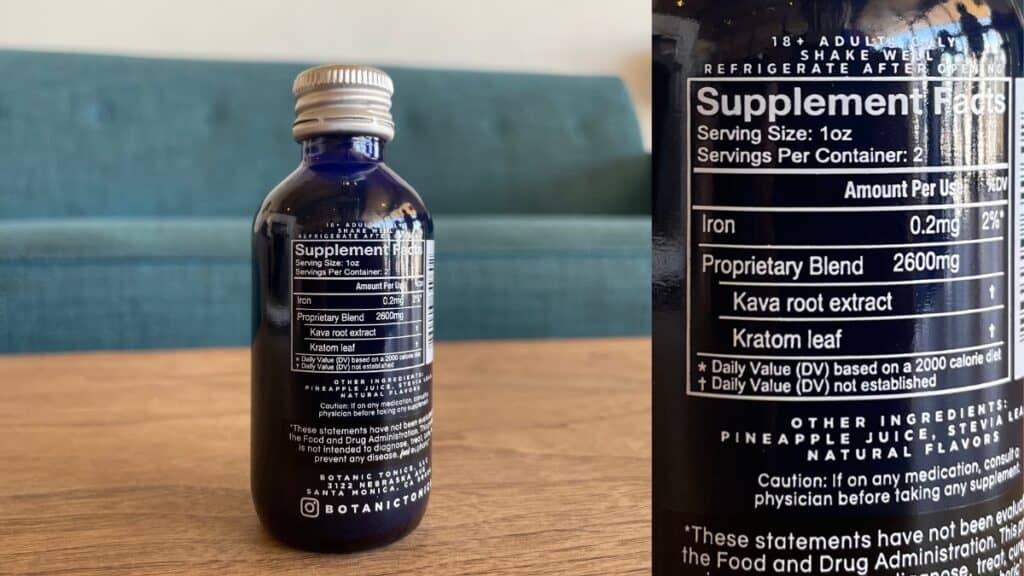
Only recently did Botanic Tonics start listing kratom as an ingredient in their Feel Free tonic. They hid the fact that Feel Free contains kratom on their website for numerous years.
Why didn’t Botanic Tonics List Kratom as an Ingredient?
Given the unethical nature of omitting ingredients in a product, why would Botanic Tonics do this? Given kratom’s unjust bad reputation, it is not hard to guess.
Since 1943, kratom has regularly been misunderstood and demonized unjustly. The first instance of kratom prohibition was in Thailand. There, citizens successfully used kratom to get off of opium, which was legally sold and heavily taxed. The Thai government lost tax revenue as a result. They banned the tree, despite the fact that it had been used traditionally for centuries.
In 2016, the US tried to ban kratom as well. This attempt failed due to a lack of scientific evidence and public and political outcries.
Kratom maintains its legal status on a federal level. However, a handful of states, municipalities, and private companies have opted to ban kratom. These various prohibitions have resulted in difficulties with a number of challenges for kratom vendors and consumers. There are restrictions on credit card processing, marketing, the ability to sell or advertise on Amazon, Facebook, Google, Instagram, etc. Additionally, kratom vendors may face routine antagonism from the FDA.
We explore the history of kratom’s bad publicity in other posts, so we won’t spend much more time discussing it here. The takeaway is that despite overwhelming scientific evidence regarding the relatively low risk of kratom products, it continues to be misunderstood and wrongly characterized.
A Tactic to Advertise and Sell Kratom on Amazon
By failing to overtly list kratom as an ingredient in their product, Botanic Tonics has been able to avoid the stigma associated with selling a kratom product. They are thus able to advertise and sell Feel Free in marketplaces that are normally prohibited.
Botanic Tonics’ Feel Free is available on Amazon. This is possible because they don’t mention kratom anywhere in the product description. They only show their “supplement facts” label which has kratom leaf listed. However, this label isn’t searchable text, so it allows them to get around the Amazon kratom restrictions.
By not listing it, and therefore greatly increasing the relative harm that is possible from kratom products (e.g. not knowing how much you are taking, or that you should not mix it with certain products such as antihistamines, blood pressure medication, and alcohol) Feel Free has put kratom back into the spotlight in the worst way. Kratom is already in a precarious position. This blatant dishonesty puts everyone who benefits from kratom at risk of losing access to it altogether.
Botanic Tonics’ History of Unsavory & Dishonest Marketing
Feel Free Botanics is being sued for “False Advertising…; common law fraud; breach of the implied warranty of merchantability; and unjust enrichment.” These allegations stem from their purported targeting of vulnerable populations on social media, as well as their alleged failure to disclose kratom as an ingredient.
We’ve experienced Botanic Tonics omissions firsthand. In fact, a couple years before joining the Top Tree family, one of our Top Tree team members briefly worked on projects for them. In 2021, the kratom tonic company reached out to Rickie Mixon on a freelancing platform. They had found her through one of her online offers that advertised her writing services. She had offered to write on the kratom, kava, and botanicals niche. Although her listing included offers to write about both kratom and kava, the Botanic Tonics representative who contacted her for the company only expressed interest in kava-related blog content.
Botanic Tonics Actively Hid Kratom from Their Consumers
When discussing the guidelines for the article that Mixon was hired to write, Botanic Tonics specified twice that Mixon should not use the word “kratom” in her post. They asked her to only mention kava and “other ancient plants” – they themselves put the phrase in quotation marks.
Looking back, it seems like they were implying that their ingredients list was intentionally left nebulous. They also asked Mixon to remove the word “kratom” from her article listing. At the time, Mixon didn’t think much of this. She simply assumed that their Feel Free Tonic did not contain kratom, especially since there was no mention of kratom in their other articles, their marketing, or on their online product page.
During the time that she was writing for Botanic Tonics, Mixon looked into the website for more information on the Feel Free tonic. She noticed some possibly problematic marketing claims, and brought it up with them. The company did not seem to want to rewrite these misleading statements.
So, when the lawsuit became public, Mixon was very surprised to find that the Feel Free tonic drink had contained kratom. Not once during her interactions with them did the company inform her that kratom was in any of their products. After all, they went out of their way to avoid attaching the ingredient to their product.
The Feel Free Lawsuit Plaintiff’s Story
While we are clearly disappointed and angered by Botanic Tonics’ dishonesty and misrepresentation of their product, the suit against them isn’t necessarily straightforward.
The plaintiff, Romulo Torres, said that he was sober from alcohol for around six years. In 2020, he purchased Feel Free tonics and became addicted to them. He was soon in the throes of an all-consuming addiction, downing 10 bottles of Feel Free tonic each day.
To deal with his Feel Free addiction, he claims, he started drinking alcohol again. Torres said he had to do this, “to ease the worsening effects of Feel Free’s withdrawal.”
Given Botanic Tonic’s lack of transparency in the past, it is impossible to say whether there might be undisclosed adulterants or incorrectly-reported concentrations of kratom and kava in their product which may be responsible for the plaintiff’s alleged reaction to it.
It is also possible, since everyone has a unique physiology, that the plaintiff reacts poorly to one of the ingredients – or the combination of them – in a way that isn’t reflected in the broader population. In this case, the plaintiff should be rightfully angry at Botanic Tonics for minimizing the presence of kratom in their product.
How Does the Feel Free Lawsuit Impact the Kratom Industry at Large?
The Feel Free lawsuit is one of many kratom lawsuits that are popping up, though some cases are far less clear and substantiated. The kratom industry is being inundated with lawsuits and various state and local ban propositions.
Unfortunately, a number of news articles on the Feel Free lawsuit fail to mention Botanic Tonics by name or go in-depth about how the company’s marketing of their “wellness tonic” was problematic.
Sensationalization and Misrepresentation of Kratom Industry Issues
Rather, you’ll find articles with titles such as “$3 Million Worth of Kratom Seized by U.S. Marshals,” as if the use of kratom in the Feel Free plant-based tonic is the only problem with the whole company. These articles give a very misleading impression of the kratom industry as a whole. They’re treating Botanic Tonics as “just another kratom vendor.”
This is harmful to the many kratom vendors who make strong efforts to prioritize customer safety by being completely transparent about their ingredients, lab tests, and manufacturing standards. Any reputable kratom brand understands that these measures are important for preventing the perpetuation of misinformation about kratom and its effects.
Kratom vendors have to be ethical in their actions if they want to support the community of millions of consumers who benefit from kratom. According to the US Health and Human Services, losing access to kratom would cause, a “significant risk of immediate adverse public health consequences.”
The Importance of Avoiding Companies Like Feel Free
Vendors like Botanic Tonics who misrepresent their kratom products hurt the entire industry. They have disregarded the health of their consumers and jeopardized consumers’ access to kratom as a whole. Botanic Tonics’ Feel Free drink should not be discussed in the same vein as pure, lab-tested plain-leaf kratom products. The Feel Free Tonic is a representation of everything a good kratom vendor strives to avoid producing.
Kratom vendors (or other makers of botanical drinks, products, and supplements) should aim to be 100% transparent in their labeling and marketing. They should perform 3rd-party lab tests on kratom and make these tests available to all. They should provide suggested serving sizes and caution against overconsumption.
The makers and advertisers of Feel Free really dropped the ball on their consumers and the kratom community (who, for the longest time, didn’t even know to consider Botanic Tonics Feel Free as a kratom company)!
Related: Did OPMS Black Liquid Extract marketing and labeling issues contribute to the OPMS Kratom Lawsuits?
At Top Tree, we’re pretty appalled at the practices used to push the Feel Free kratom/kava drink on unwitting customers. We personally believe that following traditional consumption practices (such as brewing a mild kratom tea) is best—NOT by throwing a bunch of “proprietary” ingredients into one super-concentrated tonic. Why reinvent the wheel and invite unnecessary risk when traditional methods of consumption have centuries of safe use associated with them?
May Update: Feel Free Kratom Seized from Oklahoma Warehouse
On May 2nd, Botanic Tonic’s warehouse of kratom products was raided in Tulsa, Oklahoma. The press release issued jointly by the FDA and US Attorney’s Office stated that $3 million dollars of Feel Free Tonic were seized.
JW Ross, the owner and founder of Botanic Tonics has claimed that his cost was only $400,000. Police are known to routinely exaggerate the street value of their raids, so it is likely that JW Ross is correct in regards to the press release hyperbole. Still, it was an almost unheard-of kratom raid in Oklahoma.
Was This Kratom Seizure Properly Justified?
Botanic Tonics deliberately and continuously unethically marketed their products by not disclosing that kratom was an ingredient, yet the raid reports made no mention of that. Instead, the mere presence of kratom was listed as the reason for the raid.
“The complaint alleges that kratom is a dietary ingredient for which there is inadequate information to provide reasonable assurance that it does not present a significant or unreasonable risk of illness or injury.”
In short, instead of conducting the raid for the sake of public safety regarding poorly labelled products, the justification was based on invalidated reasoning, namely that kratom is a dangerous product.
The FDA is very aware that this claim is untrue. They were explicitly told that kratom was a net benefit by their boss, the head of Health and Human Services in 2017. Speculating now, it seems as though they want to extend the outrage momentum that is righteously directed toward Botanic Tonics to the kratom industry as a whole.
Botanic Tonics plans to counter sue the FDA and US Attorney’s Office.
This story continues to evolve, so keep checking back for updates.
What Is the Best Way to Normalize Kratom?
We believe that it is crucial to normalize kratom – to make it as safe and well-understood as coffee or any other tea. No one should be stigmatized for drinking tea, regardless of their personal reason for doing so. Especially because many people assert that kratom improves their overall quality of life.
We believe that individuals should have the freedom to choose what they put into their own bodies. Similarly, they should be able to manipulate their own states of consciousness as they see fit.
Which foods, drinks, and other substances you consume is a personal and intimate decision. Neither social stigma nor legislation should stand in the way of this integral liberty. What does it mean to have “unalienable Rights, that among these are Life, Liberty and the pursuit of Happiness” if the control of one’s own food, wellness, and mind aren’t included?
We founded Top Tree Herbs with the singular mission of normalizing kratom. We make it in tea bags, educate consumers on best consumption practices, and use rigorous quality control measures.
We deliver only the best, cleanest kratom to our customers. We promise to be transparent, and never mislead you about what is in your tea. Top Tree will continue to advocate for responsible consumption and an accurate portrayal of our beloved leaf.
